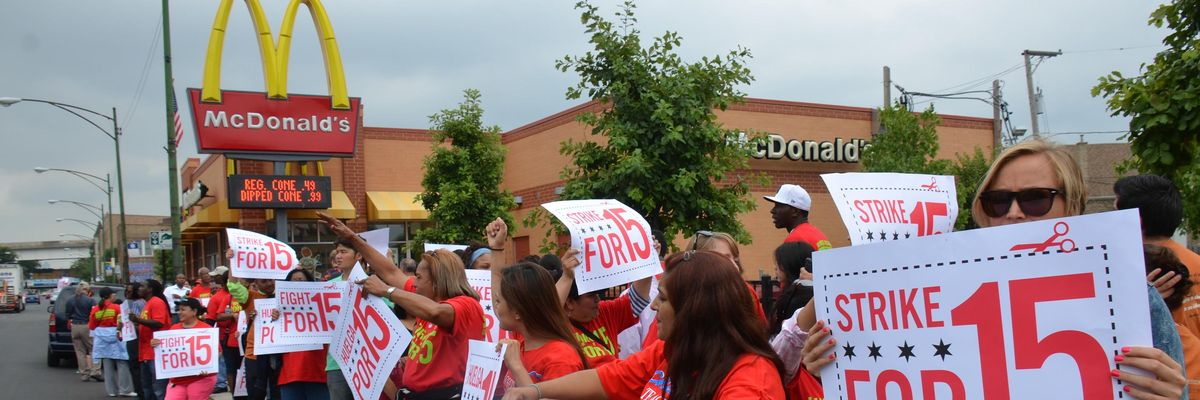

SUBSCRIBE TO OUR FREE NEWSLETTER
Daily news & progressive opinion—funded by the people, not the corporations—delivered straight to your inbox.
5
#000000
#FFFFFF
To donate by check, phone, or other method, see our More Ways to Give page.


Daily news & progressive opinion—funded by the people, not the corporations—delivered straight to your inbox.

Workers demanding $15 an hour protest outside a McDonald's restaurant. (Photo: Steve Rhodes/CC BY-NC-ND 2.0)
Just months after her now-infamous thumbs-down vote on a similar measure at the federal level, the people of U.S. Sen. Kyrsten Sinema's hometown of Tucson, Arizona overwhelmingly approved a ballot initiative on Tuesday to increase the city's minimum wage to $15 an hour.
According to unofficial results posted by the city, Proposition 206 passed with approximately 60% of the vote compared to roughly 32% who rejected it.
Passage means Tucson's minimum wage will incrementally bump up from its current $12.15 to $15 by January 1, 2025. Tucson Fight for $15 led the campaign in support of it.
A right-wing Democrat who's obstructed multiple progressive legislative priorities, Sinema (D-Ariz.) drew strong criticism in March when she voted, along with six other Democrats, against including a $15 federal minimum wage provision in the Senate's Covid relief budget reconciliation package. Increasing the federal minimum wage to $15 is overwhelmingly supported by Democratic voters, according to recent polling by Data for Progress.
In a Monday op-ed encouraging voters to back Proposition 206, Arizona Republic columnist Elvia Diaz wrote that voting yes should be "a no-brainer" for Tucson voters. She argued that even "$15 per hour is hardly a living wage" and that critics' arguments that the wage increase would unleash a "bureaucratic nightmare" were baseless.
"Those chamber-of-commerce types will always oppose paying workers more," she wrote, "no matter what."
Trump and Musk are on an unconstitutional rampage, aiming for virtually every corner of the federal government. These two right-wing billionaires are targeting nurses, scientists, teachers, daycare providers, judges, veterans, air traffic controllers, and nuclear safety inspectors. No one is safe. The food stamps program, Social Security, Medicare, and Medicaid are next. It’s an unprecedented disaster and a five-alarm fire, but there will be a reckoning. The people did not vote for this. The American people do not want this dystopian hellscape that hides behind claims of “efficiency.” Still, in reality, it is all a giveaway to corporate interests and the libertarian dreams of far-right oligarchs like Musk. Common Dreams is playing a vital role by reporting day and night on this orgy of corruption and greed, as well as what everyday people can do to organize and fight back. As a people-powered nonprofit news outlet, we cover issues the corporate media never will, but we can only continue with our readers’ support. |
Just months after her now-infamous thumbs-down vote on a similar measure at the federal level, the people of U.S. Sen. Kyrsten Sinema's hometown of Tucson, Arizona overwhelmingly approved a ballot initiative on Tuesday to increase the city's minimum wage to $15 an hour.
According to unofficial results posted by the city, Proposition 206 passed with approximately 60% of the vote compared to roughly 32% who rejected it.
Passage means Tucson's minimum wage will incrementally bump up from its current $12.15 to $15 by January 1, 2025. Tucson Fight for $15 led the campaign in support of it.
A right-wing Democrat who's obstructed multiple progressive legislative priorities, Sinema (D-Ariz.) drew strong criticism in March when she voted, along with six other Democrats, against including a $15 federal minimum wage provision in the Senate's Covid relief budget reconciliation package. Increasing the federal minimum wage to $15 is overwhelmingly supported by Democratic voters, according to recent polling by Data for Progress.
In a Monday op-ed encouraging voters to back Proposition 206, Arizona Republic columnist Elvia Diaz wrote that voting yes should be "a no-brainer" for Tucson voters. She argued that even "$15 per hour is hardly a living wage" and that critics' arguments that the wage increase would unleash a "bureaucratic nightmare" were baseless.
"Those chamber-of-commerce types will always oppose paying workers more," she wrote, "no matter what."
Just months after her now-infamous thumbs-down vote on a similar measure at the federal level, the people of U.S. Sen. Kyrsten Sinema's hometown of Tucson, Arizona overwhelmingly approved a ballot initiative on Tuesday to increase the city's minimum wage to $15 an hour.
According to unofficial results posted by the city, Proposition 206 passed with approximately 60% of the vote compared to roughly 32% who rejected it.
Passage means Tucson's minimum wage will incrementally bump up from its current $12.15 to $15 by January 1, 2025. Tucson Fight for $15 led the campaign in support of it.
A right-wing Democrat who's obstructed multiple progressive legislative priorities, Sinema (D-Ariz.) drew strong criticism in March when she voted, along with six other Democrats, against including a $15 federal minimum wage provision in the Senate's Covid relief budget reconciliation package. Increasing the federal minimum wage to $15 is overwhelmingly supported by Democratic voters, according to recent polling by Data for Progress.
In a Monday op-ed encouraging voters to back Proposition 206, Arizona Republic columnist Elvia Diaz wrote that voting yes should be "a no-brainer" for Tucson voters. She argued that even "$15 per hour is hardly a living wage" and that critics' arguments that the wage increase would unleash a "bureaucratic nightmare" were baseless.
"Those chamber-of-commerce types will always oppose paying workers more," she wrote, "no matter what."